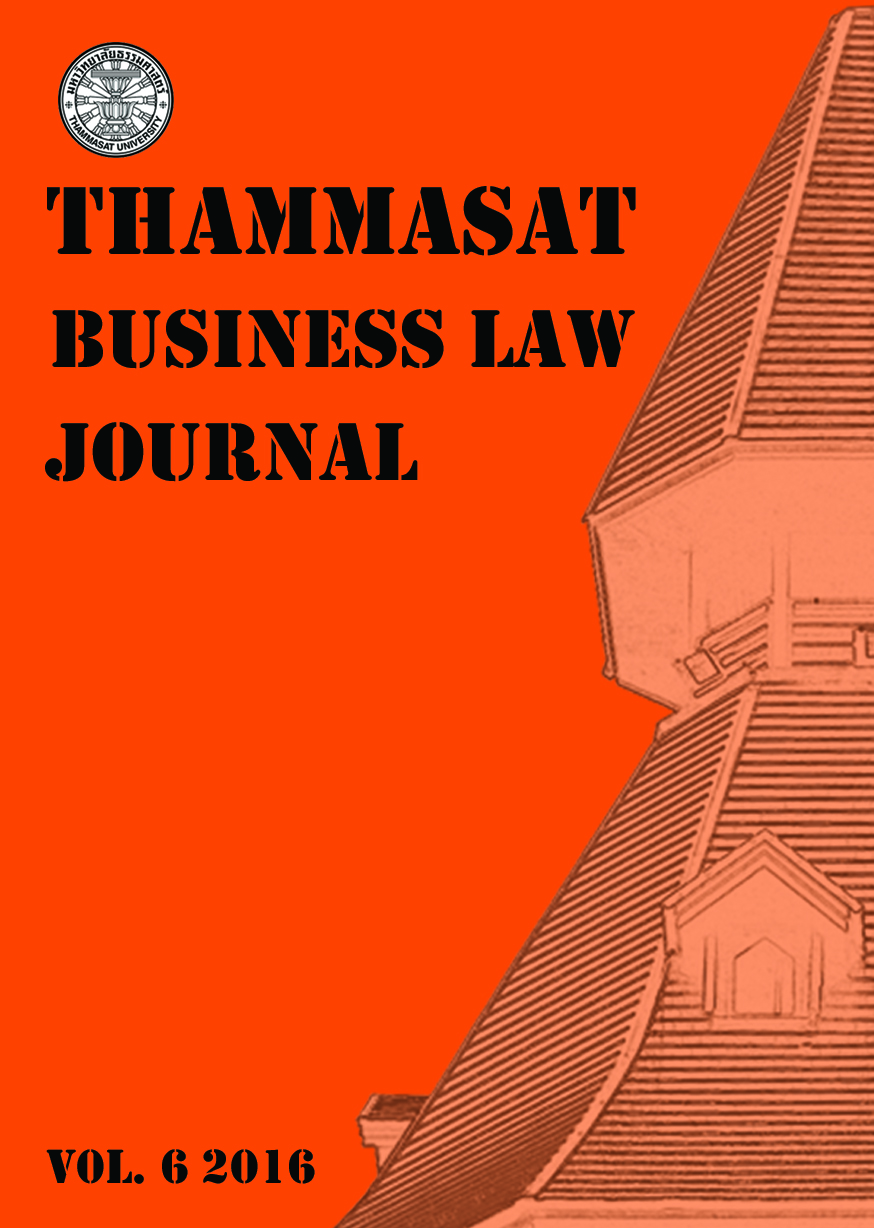TRANSPARENCY MEASURES TO CONTROL FINANCIAL INTERACTIONS BETWEEN PHYSICIANS OR HEALTHCARE PROFESSIONALS AND PHARMACEUTICAL COMPANIES
Main Article Content
Abstract
It is unavoidable that medicine is one of the key fundamental things for human’s needs. Nevertheless, medicine has its special qualification different from other general products because it could directly cause harm and risk to health and life of consumers. In addition, it is not freely available for consumer’s purchase as other consumer goods since medicine is specific, and it requires knowledge and skills of the well trained experts, in order to provide proficient and efficient diagnosis. Consequently, patients are not at the position to select their own treatment, but to lay their trust on physician or healthcare professional to perform this role for them instead. Therefore, prior to consumption of the medicines, the patients always decide to receive recommendation or diagnosis from physicians or healthcare professionals who are experts in their relevant fields, and patients dependably put their trust on them for their solution of what medications are genuinely essential for them. This is a reason why the physicians and healthcare professionals must prioritize their patients with their best attempts since most of the patients are reliant upon the physicians and healthcare professionals who are expected to put the needs of the patient as the first priority.
Even consumers are confident the physicians and healthcare professionals to act in the best interests of their patients, the medicines are manufactured and sold by pharmaceutical companies similarly as other general items in business sector, and most consumers are widely unaware of the direct and indirect influence of the pharmaceutical companies’ marketing over the physicians and healthcare professionals they depend on. To stimulate their companies’ sale volume, the physicians particularly are the major targets for the marketing of pharmaceutical companies due to the authorization to prescribe and a high status in society, so their decision could determines success of each product. Therefore, it is not surprising that the majority of marketing strategies spent by pharmaceutical companies go towards direct-to-physician promotion that leads to problem of conflict of interest between the physicians or healthcare professionals and the pharmaceutical companies. This relationship is very sophisticated than we have imagined since this kind of relationship comprising of useful financial support and improper financial interactions that could cause many serious results from irrational use of medicine until bribery or corruption.
From all previously mentioned, if prescriptions from physicians and healthcare professionals are truly transparent and free from any conflicts of interest with the pharmaceutical companies under monitoring and controlling by efficient measure, the ultimate interest would be with the patients, as consumers, and with the state. In this regards, this article focuses on transparency measures to control financial interactions between the physician or healthcare professionals and the pharmaceutical companies by studying existing measures applied in overseas and comparing with current situations of Thailand. The study will provide analysis and recommendations to enhance the effective enforcement of the transparency measure and to find out the potential results that suitable for Thailand.
Article Details
References
Patient Protection and Affordable Care Act (2010)
พระราชบัญญัติประกอบรัฐธรรมนูญว่าด้วยผู้ตรวจการแผ่นดิน พ.ศ. 2552 (The Organic Act on Ombudsman B.E. 2552)
พระราชบัญญัติขายตรงและตลาดแบบตรง พ.ศ. 2545 (Direct Selling and Direct Marketing Act B.E. 2545)
พระราชบัญญัติคุ้มครองผู้บริโภค พ.ศ. 2522 (Consumer Protection Act B.E. 2522)
พระราชบัญญัติยา พ.ศ. 2510 (Drug Act B.E. 2510)
ร่างพระราชบัญญัติยา พ.ศ.... (ฉบับสำนักงานคณะกรรมการกฤษฎีกา) (Draft Drug Act B.E…. (Office of the Council of State Version))
ร่างพระราชบัญญัติยา พ.ศ.... (ฉบับประชาชน) (Draft Drug Act B.E….(Public Version))
ประกาศกระทรวงสาธารณสุขว่าด้วยเกณฑ์จริยธรรมการจัดซื้อจัดหาและการส่งเสริมการขายยาและเวชภัณฑ์ที่มิใช่ยาของกระทรวงสาธารณสุข พ.ศ. 2557 (Notification of the Ministry of Public Health on the Code of Conduct for Procurement and Sale Promotion of Drugs and Medical Supplies B.E. 2557)
เกณฑ์จริยธรรมฉบับที่ 9 พ.ศ. 2555 ของสมาคมผู้วิจัยและผลิตเภสัชภัณฑ์ (Code of Practices 9TH Edition, 2012 of Pharmaceutical Research & Manufacturers Association)
เกณฑ์จริยธรรมว่าด้วยการส่งเสริมการขายยาของประเทศไทย (Code of Conduct for Drug Sales Promotion in Thailand)
ข้อบังคับแพทยสภา ว่าด้วยการรักษาจริยธรรมแห่งวิชาชีพเวชกรรม พ.ศ. 2549 (The Medical Council Regulations on Medical Ethics Preservation of Thailand B.E. 2549)
มติสมัชชาสุขภาพครั้งที่ 2, ยุติการส่งเสริมการขายยาที่ขาดจริยธรรม: เพื่อลดความสูญเสียทางเศรษฐกิจและสุขภาพของผู้ป่วย, กรุงเทพฯ, 2552 (Resolution of National Health Assembly No. 2, Stop Unethical Drug Sale Promotion to Decrease Economic Lost and for the Sake of Patient’s Health, Bangkok 2009)


